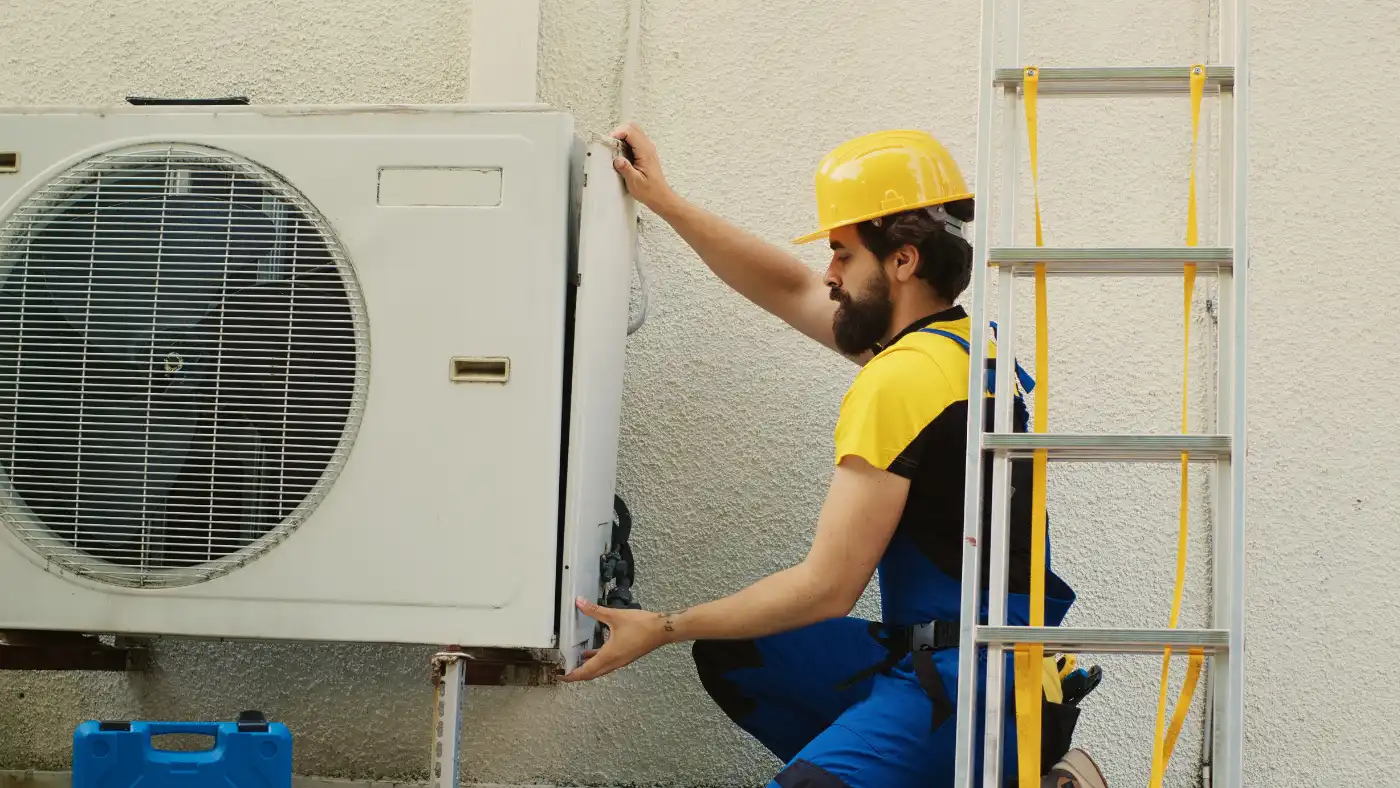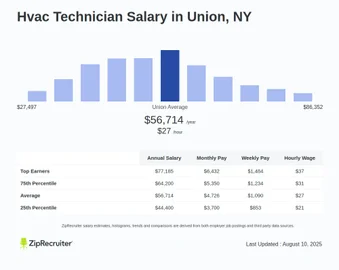Are you curious about how much HVAC technicians in unions actually get paid? If you’re thinking about a career in this field or wondering if joining a union could boost your income, you’re in the right place.
Understanding union pay rates can help you make smarter choices for your future and know exactly what to expect. Keep reading, and you’ll discover the real numbers behind union wages and why they matter for your paycheck.

Credit: www.housecallpro.com
Union Impact On Hvac Salaries
The role of unions in shaping HVAC technicians’ salaries is significant and often overlooked. Being part of a union can directly influence not just how much you earn, but also the quality of your work life. Understanding these impacts can help you decide whether joining a union aligns with your career goals.
Union Wage Standards
Union membership typically guarantees a minimum wage floor, which means you won’t have to negotiate your starting salary from scratch. These wage standards are negotiated collectively, often leading to higher pay than non-union counterparts.
For example, many union contracts include scheduled wage increases based on experience and certifications. This predictable growth can make a big difference in your long-term earnings.
Benefits Beyond Pay
Union contracts often include benefits that go beyond your paycheck. Health insurance, retirement plans, and paid training are common perks that add real value to your compensation package.
Imagine having your health coverage taken care of or access to ongoing education without worrying about extra costs. These benefits can save you thousands annually and improve your work-life balance.
Job Security Advantages
Union membership often comes with stronger job security compared to non-union roles. Unions negotiate terms that protect you from unfair layoffs or sudden job loss.
Have you ever worried about how long your job will last in a slow season? Being in a union can provide peace of mind, knowing there are rules and support systems in place to defend your position.
Average Hvac Technician Salaries
Understanding the average salaries of HVAC technicians in unions gives you a clearer picture of what to expect in this trade. Salaries vary widely depending on factors like location, experience, and union membership. Knowing these details helps you plan your career or negotiate your pay effectively.
National Salary Averages
Across the United States, unionized HVAC technicians typically earn higher wages than their non-union counterparts. On average, the yearly salary ranges between $50,000 and $75,000. Benefits like health insurance and retirement plans often add significant value beyond the base pay.
Have you considered how much those benefits could increase your overall compensation? Sometimes, the total package matters more than the paycheck alone.
Regional Salary Differences
Your location plays a big role in how much you get paid. States with higher living costs, such as California and New York, often offer HVAC technicians union wages in the range of $65,000 to $85,000annually. Meanwhile, in more affordable regions like the Midwest or the South, salaries might hover closer to $45,000 to $60,000.
These differences reflect local demand, union strength, and economic conditions. Are you willing to relocate for a better salary or benefits package? That’s a question worth asking yourself.
Entry-level Vs Experienced Pay
New union members typically start at lower wages, around $20 to $25 per hour. However, as you gain certifications and years of experience, your hourly rate can climb to $35 or more. Journeyman HVAC technicians often earn significantly more than apprentices.
Keep in mind that overtime and special projects can boost your income as well. How quickly you advance depends on your commitment to learning and skill development.
Factors Influencing Union Pay
Understanding what affects union pay for HVAC technicians can help you navigate your career choices better. Several factors come into play, shaping the wages you might expect in this field. Knowing these can empower you to make informed decisions about training, location, and career growth.
Local Union Agreements
Each local union negotiates pay rates based on the cost of living and economic conditions in their area. This means the wages can vary significantly from one city or state to another. If you’re considering relocating, reviewing local union contracts can give you a clear picture of what to expect.
For example, a union in a metropolitan area might secure higher wages due to the higher living costs compared to a rural region. These agreements often include benefits like health insurance and retirement plans, adding value beyond just the hourly pay.
Industry Demand
The demand for HVAC technicians in your region directly impacts union wages. When demand is high, unions have more leverage to negotiate better pay and benefits. This is especially true during peak seasons or when new construction projects increase the need for skilled technicians.
Have you noticed more construction or renovation activity in your area? It might be the right time to discuss pay increases with your union. Staying aware of market trends can give you an edge when negotiating your salary.
Certification And Training Levels
Your skills and certifications play a crucial role in determining your union pay. Technicians with advanced certifications or specialized training often earn higher wages. This reflects the added value they bring and the complexity of the tasks they can handle.
Consider investing time in obtaining certifications like EPA Section 608 or NATE. These credentials can open doors to higher-paying jobs within the union and make you more competitive. Have you checked which certifications your local union values most?
Comparing Union And Non-union Pay
Comparing pay between union and non-union HVAC technicians reveals clear differences. Union workers often earn higher wages. They also receive better benefits. Non-union technicians may have more flexible pay scales but fewer perks. Understanding these contrasts helps technicians decide their career paths.
Wage Comparisons
Union HVAC technicians usually earn more hourly. Their wages often include regular raises. Non-union workers might start with lower pay. They may get raises based on company performance or tenure. Unions negotiate wages collectively. This gives members stronger pay protection.
Benefits And Perks
Union members enjoy comprehensive benefits. These include health insurance, retirement plans, and paid leave. Non-union workers often rely on employer-provided benefits, which vary widely. Unions also provide training and safety programs. These perks add value beyond the paycheck.
Work Conditions
Union technicians benefit from safer work environments. Unions enforce safety standards and fair work hours. Non-union workers may face less regulated conditions. Unions also offer job security and grievance support. This creates a more stable work setting for members.
Career Growth And Salary Increases
Working as an HVAC technician in a union offers many benefits. One major benefit is the potential for career growth and salary increases. Unionized HVAC technicians often enjoy structured career paths and pay scales. This structure can lead to significant financial rewards over time. Let’s explore the aspects that contribute to these opportunities.
Advancement Opportunities
Union HVAC technicians often have clear paths for advancement. Promotions are often based on experience and skill level. Technicians can move from entry-level roles to supervisory positions. This progression often comes with pay raises and more responsibilities. Unions often provide training and certifications. These help technicians enhance their skills and qualify for promotions.
Overtime And Bonuses
Union HVAC technicians often have access to overtime opportunities. Overtime work can significantly boost their earnings. Many unions negotiate higher rates for overtime hours. Bonuses are sometimes available for outstanding performance. These financial incentives can make a big difference in annual income. They reward technicians for their hard work and dedication.
Impact Of Specializations
Specializing in certain HVAC systems can lead to higher pay. Technicians with expertise in advanced systems are often in demand. Specializations may include refrigeration, solar heating, or energy-efficient systems. Unionized technicians may receive additional training for these areas. This specialized knowledge can lead to higher salaries and job security. Specializations provide technicians with valuable skills that increase their value.

Credit: www.reddit.com
How To Join A Union As An Hvac Technician
Joining a union as an HVAC technician can significantly impact your career path and earnings. It offers access to better wages, benefits, and job security. But how do you actually become a member of a union? Understanding the steps involved can make the process smoother and more rewarding for you.
Apprenticeship Programs
Apprenticeship programs are the foundation for many HVAC technicians entering union work. These programs combine paid on-the-job training with classroom instruction.
You learn the practical skills needed while earning a wage, which means you don’t have to sacrifice income while training. Many unions require completion of an apprenticeship before full membership.
Look for programs sponsored by local union chapters or trade organizations. They often last 3-5 years and offer a clear path to becoming a certified technician.
Union Membership Requirements
Each union sets its own criteria for membership, but some common requirements apply.
- Completion of an approved apprenticeship program or equivalent experience
- Valid HVAC certifications or licenses as per state regulations
- Willingness to pay union dues and participate in union activities
Understanding these requirements ahead of time helps you prepare your credentials and avoid surprises. Have you checked if your current experience aligns with what the union expects?
Application Process
The application process usually starts with submitting your qualifications to the union’s hiring hall or local office.
You may need to attend an interview or take a test to demonstrate your skills and knowledge. Some unions also require recommendations or references from current members.
Once accepted, you’ll sign a membership agreement and begin paying dues. After that, you’re officially part of the union and can access all its benefits and job opportunities.

Credit: www.reddit.com
Frequently Asked Questions
What Is The Average Pay For Union Hvac Technicians?
Union HVAC technicians typically earn between $25 and $40 per hour. Pay varies by location, experience, and union contracts. Benefits like health insurance and retirement plans often enhance total compensation.
How Does Union Membership Affect Hvac Technician Wages?
Union membership usually ensures higher wages due to collective bargaining. It also provides job security and better working conditions. Union contracts set standardized pay scales for HVAC technicians.
Do Union Hvac Technicians Receive Overtime Pay?
Yes, union HVAC technicians generally receive overtime pay. Overtime rates are often 1. 5 times the regular hourly wage. This compensation is guaranteed under union agreements.
Are Benefits Included In Union Hvac Technician Pay?
Union HVAC technicians often receive benefits such as health insurance, retirement plans, and paid leave. These benefits add significant value beyond hourly wages. They are negotiated through union contracts.
Conclusion
Union HVAC technicians earn fair wages and good benefits. Their pay reflects skills, experience, and location. Union membership often leads to better job security and training. These factors help workers improve their work and income. Understanding union pay helps you make smart career choices.
Being part of a union means standing together for fair treatment. This teamwork supports better wages and safer work conditions. Overall, union HVAC technicians enjoy steady pay and many advantages.





